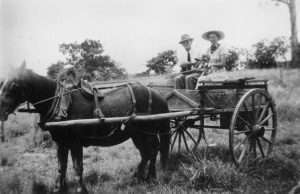 My father used to enjoy quoting a story about a brand new college graduate in the old pioneer days who wanted to impress his girlfriend. He drove his horse and buggy to the front of his girlfriend’s house. When his girlfriend’s younger brother came out to greet them, the college graduate puffed out his chest and said: “Please extract the quadruped from the vehicle, stabulate him, and donate him an adequate supply of nutrient supplements, and when the lustrous aurora of coming morn again illumines the eastern horizon, you shall be rewarded with a pecuniary compensation, fully commensurate with the generous hospitality bestowed.”
My father used to enjoy quoting a story about a brand new college graduate in the old pioneer days who wanted to impress his girlfriend. He drove his horse and buggy to the front of his girlfriend’s house. When his girlfriend’s younger brother came out to greet them, the college graduate puffed out his chest and said: “Please extract the quadruped from the vehicle, stabulate him, and donate him an adequate supply of nutrient supplements, and when the lustrous aurora of coming morn again illumines the eastern horizon, you shall be rewarded with a pecuniary compensation, fully commensurate with the generous hospitality bestowed.”
The young boy just stood there wondering what language he was hearing. Why didn’t the college student just say, “Please untie the horse from the buggy, put him in the stable, and feed him, then I will pay you some money in the morning?” What that student said may have shown off his vocabulary, but it didn’t really communicate much of anything.
I think the same principle is true when it come to medical care. When I visit a doctor, I want him to explain what is wrong with me in a way I can understand. I don’t really care how many complicated words he knows. I just want to find out what is wrong with me and how I can get feeling better.
Not only that, but I think this same idea should also apply to religion. Imposing religious ceremonies and flowery religious language may appear impressive, but words, by themselves, don’t do us any good. They need to communicate to me what my problem is and how it can be fixed.
We should all feel that way about our broken human condition.
One of our most loved Christian hymns talks about the importance of keeping our faith in God simple. It was written in 1866 by Katherine Hankey when she became very sick. She lay in bed thinking about all the people who had heard about Jesus, and thinking about the love He showed by dying on the Cross. Then she thought to herself, “I wish someone would come and tell me about Christ just so I can hear it again.” Because of those thoughts, she wrote down this poem that later became a song:
Tell me the old, old story of unseen things above,
Of Jesus and his glory, of Jesus and his love.
Tell me the story simply, as to a little child,
For I am weak and weary, and helpless and defiled.
Katherine wasn’t longing for something complicated. She just wanted to hear the simple truths about a glorious Christ and who gave His life to save her. Then she continued:
Tell me the story slowly, that I may take it in,
That wonderful redemption, God’s remedy for sin.
Tell me the story often, for I forget so soon;
The early dew of morning has passed away at noon.
The simplicity of the message of Christ should govern how we worship, too. Born-again Christians enjoy singing about how wonderful the God of the Bible is and thinking about Him. Sunday is the greatest day of the week for us because we can take extra time to just think about Jesus and learn more about His marvelous glory. Those simple facts have changed our lives. I’m glad that the good news about Christ is so simple that anyone—even me—can understand it.
The highly educated Apostle Paul said, “Christ did not send me to baptize, but to preach the gospel, not in cleverness of speech, so that the cross of Christ would not be made void. For the word of the cross is foolishness to those who are perishing, but to us who are being saved it is the power of God” (1 Corinthians 1:17–18).
Do you know these simple truths about God’s plan to rescue us from the bondage and penalty of sin? If you contact me, I will mail you a free pamphlet that will explain more about them to you. Unless you request it, no one will bother you by phone or in person. You can read this life changing information in the privacy of your own home. I hope to hear from you and that the simple words I will send you will set you free from the fear of death and the bondage of sin.

Leave A Comment